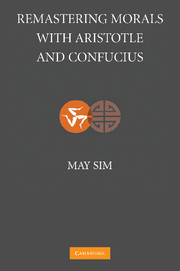Book contents
- Frontmatter
- Contents
- Acknowledgments
- Abbreviations
- Introduction
- 1 Aristotle in the Reconstruction of Confucian Ethics
- 2 Categories and Commensurability in Confucius and Aristotle: A Response to MacIntyre
- 3 Ritual and Realism in Early Chinese Science
- 4 Harmony and the Mean in the Nicomachean Ethics and the Zhongyong
- 5 The Moral Self in Confucius and Aristotle
- 6 Virtue-Oriented Politics: Confucius and Aristotle
- 7 Making Friends with Confucius and Aristotle
- Glossary of Chinese Terms
- Name Index
- Subject Index
6 - Virtue-Oriented Politics: Confucius and Aristotle
Published online by Cambridge University Press: 18 July 2009
- Frontmatter
- Contents
- Acknowledgments
- Abbreviations
- Introduction
- 1 Aristotle in the Reconstruction of Confucian Ethics
- 2 Categories and Commensurability in Confucius and Aristotle: A Response to MacIntyre
- 3 Ritual and Realism in Early Chinese Science
- 4 Harmony and the Mean in the Nicomachean Ethics and the Zhongyong
- 5 The Moral Self in Confucius and Aristotle
- 6 Virtue-Oriented Politics: Confucius and Aristotle
- 7 Making Friends with Confucius and Aristotle
- Glossary of Chinese Terms
- Name Index
- Subject Index
Summary
On the face of it, Aristotle's view of politics seems quite different from Confucius'. Aristotle defines the polis and the citizen and analyzes them according to a teleological understanding of nature. Confucius lacks not only explicit definitions but also any explicit theories about nature and teleology. Aristotle sharply distinguishes the political rule of statesmen from the household rule of fathers. Confucius assimilates political rule into household rule; political government is simply the father–son relationship writ large. Aristotle offers an analysis of different regimes, an ideal constitution, and the best constitution in actuality. Confucius never offers a theoretical analysis of possible or actual constitutions and concentrates, for the most part, on the benevolent rule of a sage-king. They also differ with respect to the role that laws should play in the governance of a state and the role that the masses could and should play in deliberating on affairs of the state. Aristotle favors the use of laws and praises a regime in which the masses participate in public deliberations; Confucius is skeptical about both the rule of law and the masses' role in political deliberations. Aristotle claims that virtue is achieved only by the few. But Confucius articulates a life of virtue accessible to all or most.
Yet, there are similarities. Confucius and Aristotle agree that people must play different roles and functions in a state. Both men maintain that the aim of government is to make people virtuous. They agree that virtuous men make the best rulers.
- Type
- Chapter
- Information
- Remastering Morals with Aristotle and Confucius , pp. 166 - 193Publisher: Cambridge University PressPrint publication year: 2007



